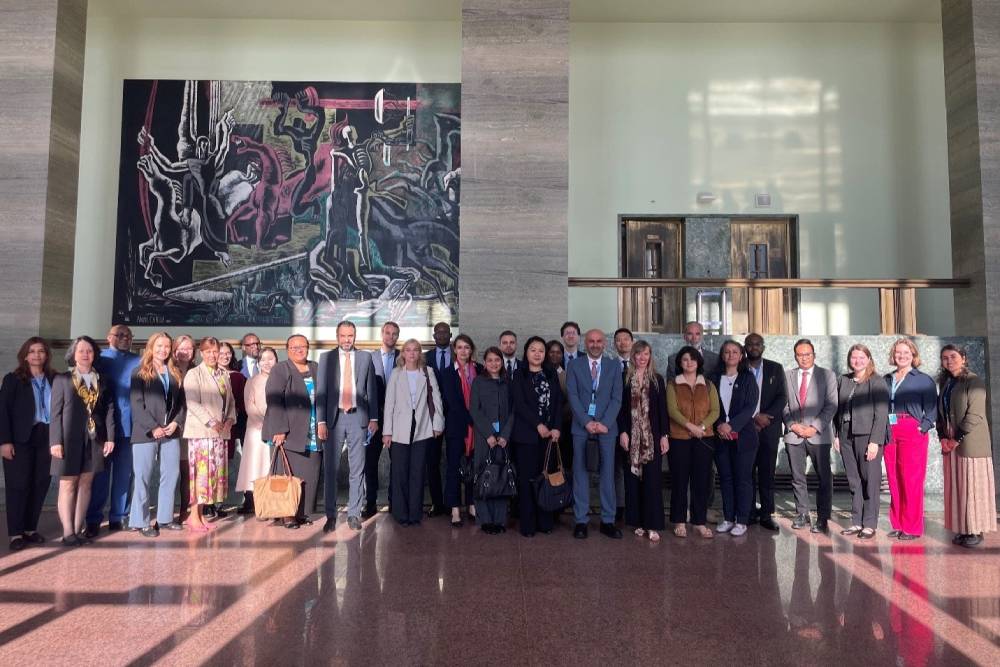UNIDIR and the United Nations Office for Disarmament Affairs (UNODA) hosted their annual Disarmament Orientation Course to support newly arrived diplomats in Geneva covering disarmament and arms control. From 15-25 September, 47 diplomats and officials representing Member States and regional organizations from across the globe gathered to gain a deeper understanding of disarmament, arms control, and the 21st century global security landscape.
Every year, diplomats from around the world arrive in Geneva to take up roles in disarmament and arms control and to engage in related negotiations. For many, it is the first time navigating this complex field. Especially delegates from smaller permanent missions, including from the Global South, are challenged as they have to simultaneously cover disarmament and a series of other multilateral topics dealt with in Geneva. Diplomats also have to quickly build up expert knowledge in the rapidly evolving global security fields as diverse and technical as outer space security, artificial intelligence in the military domain, conventional arms control, or biological weapons.
The Disarmament Orientation Course aims to increase levels of participation in Geneva-based processes and discussions by introducing the inner workings of these fora and topics. It seeks to foster relationships of trust within the Geneva disarmament community. Over the course of two weeks and six thematic modules, participants delve into some of today’s most pressing security challenges and the international disarmament and arms control instruments that seek to address and govern them.
Disarmament essentials
The course opened with keynote remarks from UNIDIR Director Robin Geiss and Chief of UNODA’s Geneva Branch Mélanie Régimbal, both of whom stressed the importance of continued dialogue, collaboration and partnerships in the sphere of disarmament.
As [today’s] landscape grows ever more fractious and volatile, what has historically been the case remains true today: precisely when disarmament and arms control negotiations seem most difficult, the need to push ahead and make progress is most critical.
Robin Geiss, UNIDIR Director

Delegates were introduced to the key resources available, such as UNIDIR’s policy portals and UNODA’s documents library, to help navigate the disarmament landscape. They exchanged with experts on the need to include gender and youth perspectives in disarmament and arms control – as women and young people are chronically underrepresented in peace and security processes, despite being particularly affected by armed conflict and violence. To ground these overarching discussions in the realities of the Geneva disarmament machinery, the course also covered the Conference on Disarmament and its subsidiary bodies – from a historical overview to the more recent efforts to revitalize this forum.
The first week concluded with a dedicated session on outer space security addressing the existing normative and legal frameworks, while introducing current approaches in the prevention of an arms race in outer space.
Today wraps up the first week of the UNIDIR-@ODA_Geneva Disarmament Orientation Course 2025 🇺🇳🤝
— United Nations Institute for Disarmament Research (@UNIDIR) September 19, 2025
Throughout the week, delegates explored current trends and developments in disarmament, outer space security and the Conference on Disarmament. pic.twitter.com/ldgydsoZJH
During the course’s second week, experts highlighted the complexities of opportunities and challenges that scientific and technological advances create for the Biological Weapons Convention. Speakers also stressed the importance of continued international cooperation and national implementation. Following the module on biological weapons, UNIDIR and UNODA experts introduced delegates to the multitude of international treaties and politically binding instruments regulating a broad range of conventional weapons and ammunition along their lifecycle.
The closing session of this year’s course explored the rapidly evolving processes and approaches to international Information and Communication Technology security, the use of artificial intelligence in the military domain, and lethal autonomous weapons systems. This included providing insights on latest outcomes and discussions such the adoption of the UN Global Mechanism to guide responsible State behaviour in cyberspace.

Partnering for greater impact
Together, UNIDIR and UNODA seek to contribute to a dynamic and inclusive environment for the Geneva-based disarmament community, while also transferring knowledge, for it to better address the complex security challenges of the 21st century. By fostering trust and promoting open dialogue between Member States and regional organizations, both organizations are committed to supporting diplomats in getting better equipped for ongoing and future disarmament and arms control negotiations for a more secure world.


